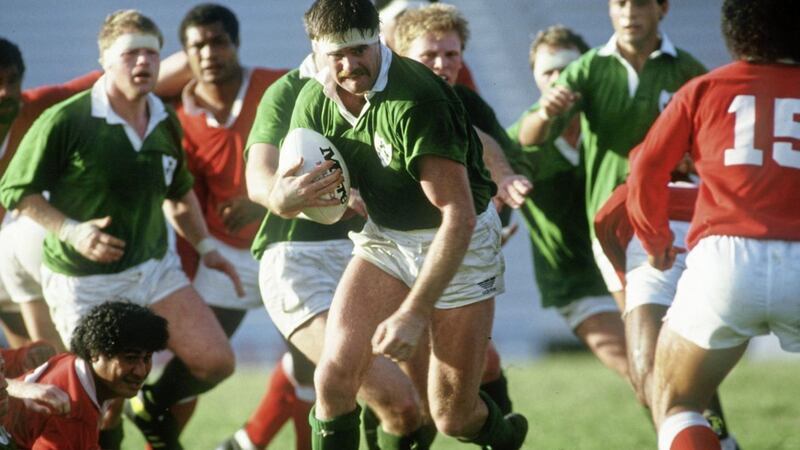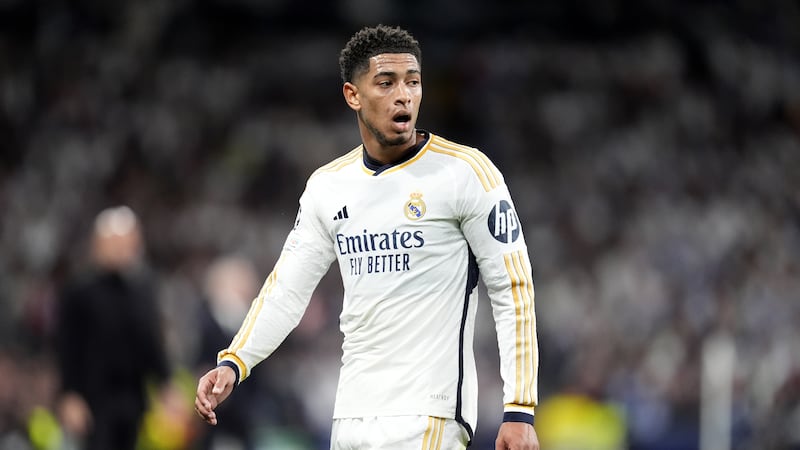Dad, I’ve spoken to you directly before and it wasn’t easy and now to speak to you directly again it’s even harder as you haven’t taken on board anything I’ve said. I want this to be you someday driving me and my kids with you. However you’ll not make it if you carry on with the way you treat your body… You brought me up as an honest, committed, hard-working man. I will not stop until you change. I know you can. Over to you now dad. I want you to come back to me and let me know how we can get over this, and how we will be driving with our kids/grandkids in the back and they will also look up to their amazing grandad! Do not sweep this under the carpet. You taught me to always face up to my problems and fears. I’m sending this with my heart full of love. Please read it and action something different tomorrow – as you know the butterfly effect too well. Call me whenever, wherever. I’m here for you. We will win.
Letter from Thomas Anderson to his father, Willie
* * * * *
AS you enter the door into Willie Anderson’s front room, the drinks cabinet sits on your right.
The base of the large decanter swims in whiskey. The devil’s water had, for a while, threatened to submerge one of Ireland and Ulster’s rugby greats.
At one stage, he was drinking from that bottle every day.
He hasn’t touched a drop in six years now.
Even when retirement plus a pandemic led to a bout of depression last Christmas, the walls never closed in that tight that he felt the urge to go back to it.
“I’d finished working. When you finish working, you think if you’re of any value.
“I’m a farmer’s son. You were never idle, because if you were, you were doing nothing.
“But that door’s closed and locked. It’s like wanting to play for Ireland – I did it. I don’t know what it is in me but if I decide that’s it, then it’s turned off. It’ll not be on again.”
This is the same farmer’s son who turned away the 80-acre inheritance in his native Sixmilecross to persist with a schooling system that didn’t know how to educate a dyslexic teenager in the days before they knew what dyslexia was.
He failed his 11-plus and his O-Levels.
But keep at it he did. He passed his English Language at the third attempt.
Through Omagh Academy, doors opened that would lead to a brilliant rugby career which culminated in his famous walk towards the Haka.
Anderson was Ireland’s captain, their lock and their leader in a feverish Lansdowne Road that night 32 years ago. All in, he won 27 caps but should have had more.
Almost four months was spent in an Argentinian jail for a “prank” that became a major diplomatic incident meant he had to work even harder to get there.
Alongside some glorious days in green, there were job losses, and the abrupt end of an international career played out against the background of the north’s troubles.
The drinking began with ‘the accident’.
December 1992, just up the road from home in The Loup.
“It was getting on for 4.20pm…” reads the passage from his searingly honest autobiography, Crossing The Line, written with Brendan Fanning.
“From my right-hand side, coming from behind a school bus, a wee lad ran out, straight across my path. There was a tractor parked behind the bus. He ran through the gap between the bus and the tractor.”
11-year-old Glen McLernon, a young rugby fanatic from the top of the road, died the next day.
An inquest was told that Anderson was not to blame. That he wasn’t speeding and the young boy had run out blind between the tractor and the bus into his path.
“There was no attempt to lay blame at my door. I suppose that should have been a relief, but when you’re in that situation you will accept any punishment because all you can feel is guilt. If you get punished then there’s a measure of atonement,” the book tells.
The image of his school tie on the windscreen will never leave Willie Anderson.
“In the book it’s a tragedy – that’s what it was for two families.
“He’s buried in the Church up the road. There’s not a day I go by and don’t think of him.
“That had a massive effect on their family. They moved over to Cornwall. It was life-changing for their family and life-changing for me and my family.”
* * * * *
‘DISRESPECTING a national symbol’.
That was the charge laid out in front of Willie Anderson and team-mate Davy Irwin.
In his university digs at home hung a huge Canadian flag. The sky-blue Argentine flag, with its sun god in the middle, would make the perfect companion.
They’d been out enjoying the hospitality in Buenos Aires with his Penguins team-mates after beating Banco Nacion. On the way back to the hotel, he spots a national flag hanging outside a building.
Long story short, they clamber up together and remove it. Within minutes of returning to the hotel, armed police are storming into the room.
It’s not a simple case of handing it back.
It had been Anderson’s idea and others went along, as they did down to the police station. Fellow Ulstermen Davy Irwin and Frank Wilson go with him, along with John Palmer from Bath.
This was Argentina in August 1980. The country is right in the middle of the Dirty War, during which somewhere between 9,000 and 30,000 people were killed or disappeared in a period of state terrorism.
The tension had also been rising between Argentina and Britain, which would shortly lead to the Falklands War.
“Ginger McLoughlin was going to go down too but he had an Irish passport and they didn’t want him – they only wanted UK passports,” recalls Anderson.
“We hadn’t done our homework as people. We wanted to go there to play rugby but we didn’t know it was such an horrific fascist regime, where people were just being dropped into the Atlantic daily.”
A frighteningly uncomfortable 24 hours followed. In pairs they were squashed into tiny cages inside police vans with only small holes in the sides for air. They were sat on chairs for what felt like a full day.
“Strip-searched, handcuffed, fingerprinted maybe 30 times, the whole shooting match.”
Yet it was only really the following morning that the reality hit home. They met with the Dudley Ankerson from the British consulate.
“You don’t appreciate the gravity of this situation,” he told them, slowly. “This is very, very serious to these people. There are a few generals in the Junta who would happily see you executed. Others want you doing 10 years hard labour in the south of
Argentina.”
When charged with ‘Disrespecting a national symbol’, Anderson recalls being led downstairs to the cells. The ‘bed’ was a cement ledge a few feet off the ground.
“There was a lump of shite in the corner of the cell,” he recalls in the book.
Davy Irwin and Frank Wilson were released after three weeks. Anderson waited almost four months for his freedom, held on city arrest after meeting bail.
In that time, he wrote four journals to the woman who would later become his wife.
The alternatives to his captivity were too dangerous. A boat to the Falklands and a flight to somewhere safe, or hiding under the floorboards on a bus to Uruguay were the options. Being caught would have resulted in certain death.
He held it together until the third week of November, when the prosecutors decided that a two-year sentence on conditional release was the answer. That allowed him to pack and go home.
His parents had scraped up £10,000 and the people of Dungannon did the same to pay his legal fees. When he returned to teach in Grosvenor High school, principal Ken Reid had the children warned off ever mentioning the whole affair.
“Out of it, I married the girl that stuck by me, and made fantastic friends. It held me back, to a point, from reaching the goal I had set as a cub. I got there in the end, playing for Ireland, but that didn’t help.”
* * * * *
WILLIE Anderson loved farming, but he loved rugby more.
His only sibling Oliver “was smarter than me”, but Willie had the natural gait and the huge shovel hands of a born farmer.
On the road between Pomeroy and Sixmilecross, they had 80 acres of land.
The family kept 200 fattening pigs and a dozen dairy cows. Over time, the hundreds of chickens would become thousands.
A Protestant farming clan in the heart of county Tyrone, it is a lifestyle that Willie Anderson both misses and yet is glad he took the step away from.
Rugby was his passport into a different world, is how he puts it.
A world where their neighbours didn’t practise “Voodoo over the hedge”, which was how he’d become conditioned to see Catholicism as a young boy growing up “in the eye of the storm”.
The mindset was created by things unsaid. He wasn’t brought up to hate or dislike. He recalls his father helping Catholic neighbours bring in hay, because that was the farming way. But he knew what he was and what he wasn’t.
It is a mindset he’s happily shed.
Among his closest friends now would be Dr Ben Glancy, the former team doctor for Derry GAA teams.
When Willie Anderson told his own people he was moving out to The Loup, an almost exclusively nationalist outpost a few miles outside Magherafelt, the reaction was universal: ‘You must be joking me?’
“But I’d come from the farm, I came from the land, and I wanted to go back to it. Honestly, I’ve never felt as welcome in a place in all my life. I’ve never had one single word but ‘it’s great to see you’.”
All through his life he butted heads with the IRFU suits. He left his job with the governing body after the accident, feeling completely abandoned by their lack of acknowledgement of it.
The famous night of the New Zealand game, which ended in defeat as they always did until recent years, he made a speech in which he mentioned his friend Bob Glover, a local Protestant employer who had earlier that week been killed by an IRA bomb because his family contracting firm had supplied building material to the security forces.
Willie Anderson played in the green, he stood under the tricolor and he was proud to play for Ireland. But he was a middle-of-the-road Protestant and equally proud of that.
“When I brought Bob’s name up, even though I’d played and achieved the greatest accolade ever, to captain your country against the All Blacks, it’s minimal in terms of someone who’s killed. He was a friend of mine and he was blown up.
“I was saying it was fantastic to play this but this is what life’s about where we are. It could have easily been a Catholic. It could have been anybody. The IRFU’s view was ‘you’re not allowed to talk about that’.
“But it wasn’t a political thing – it was a friend of mine has been blown up, and I’m mourning that.”
One of his sporting regrets is never having a proper chance to play Gaelic football. He’d be at home on the farm on Sundays, watching the neighbours heading off with their kitbags to play.
“We weren’t allowed to so much as whistle on a Sunday.”
When he moved to Magherafelt in the early ‘80s, Anderson trained with the O’Donovan Rossas in Magherafelt every summer. After going out the road to The Loup, he ended up drawn into doing a small bit of coaching there, which led on to playing a game up in Slaughtmanus, not far from Derry city.
“I always loved Gaelic football and wish I’d had the chance to play it when I was younger.
“I’ll never forget going up to Slaughtmanus, going up with a couple of boys from The Loup. It was my first game. I said to them in the car: ‘After the match, will we have a couple of pints with the boys?’
“When we went out through the barbed wire and got the volley of abuse, and the very living daylights kicked out of us, I didn’t think we’d be going in for a pint with them after it!”
Anderson’s son Thomas played for Loup up until minor before having to make a choice, going his father’s route into an Ulster rugby jersey.
All three of he and Heather’s children operate out of London. Jonathan and Thomas are both back and forward to Paris, with the latter working for the former.
The name JW Anderson is one of the biggest in the world of fashion. You’re talking Beyonce, Dua Lipa, Gwyneth Paltrow, Rihanna, Alexa Chung, these are the names bearing his brand.
While Thomas was a straight-A student, Jonathan and Chloe had both inherited their father’s dyslexia.
“Nobody would have known I was dyslexic. I would have been writing a sentence and maybe left three words out of it.
“Jonathan, totally dyslexic. Chloe, totally dyslexic. Even moreso than me. But both of them driven to learn how to learn. Both of them got 2:1s in university. Unbelievable.
“When Jonathan got assessed in the British college of Fashion in London, they said: ‘You are the worst we’ve ever seen – how did you get here?’
“But he would have had half a wall of spider diagrams in different colours, that’s how he learned.
“From early doors, he was a genius. He is a genius. He is famous. He has a drive to be the number one fashion designer in the world.”
His eye for design didn’t fall off the trees. Heather’s father, James Buckley, died two years ago at the age of 95 having lived an extraordinary life in Cheshire that included work as a designer for Lamont, playing football for Wolves and fighting in the Second World War.
When Jonathan was in his late teenage years, he told his parents he was gay. It never took a fizz out of them.
“We knew before that. When he came out, we just said ‘it doesn’t matter, we love you’.
“We’re so proud of him. It doesn’t matter one iota. I learned through all the things, a lot of people have said to me and Heather, about us telling our kids we love them all the time.
“It’s an easy thing to say but a lot of people don’t do it. It never happened to me.
“The number of people I’d have been talking to and said ‘did your Mum and Dad say they loved you?’ and they said ‘no’.
“And you’d say ‘have you said it to your kids?’ And they don’t.”
* * * * *
WHEN he arrived for his first session at Addiction NI, the counsellor met Willie Anderson at the door.
‘Either you want to be here or you don’t want to be here. Your choice.’
This was one of Ireland’s biggest names from the final era of amateur international rugby. The man who stared down the Haka and pulled his team-mates in with him, before breaking and waving the crowd furiously into a frenzy.
Those days were gone. Coping with change was always a test. Whether it was rugby finishing or losing jobs or retirement, the period of adjustment was difficult.
His playing days are such a huge part of his identity and yet the tales from the pitch hardly have room for a breath in a brilliant book like Crossing The Line.
It is a book that displays all that has changed in rugby in the professional era. You could read one autobiography from the last 15 years and you’d have read them all. Dull, monotonous, full of air.
Willie Anderson is from a different generation. When he decided he would do a book, it would be done right. This would be a story of his life, left for his grandchildren.
Thomas’s letter hit home, hard. The children and grandchildren needed him around.
His drinking had manifested itself from the accident. It was his coping mechanism, his way of numbing the pain and the guilt.
Life has thrown more challenges at him than most.
In considering what he will leave behind, he returns to his father-in-law’s final days.
“When we were in visiting him, there were so many people who had kids, and nobody came to see them.
“If you’re asking me how you’d like to be regarded, it would be that the people you love, they love you back at the end. That’s the test.”







